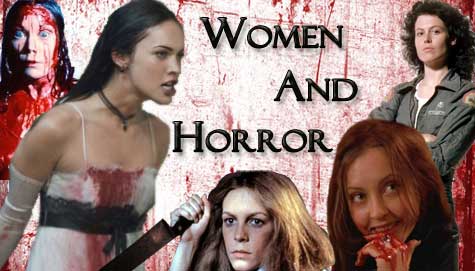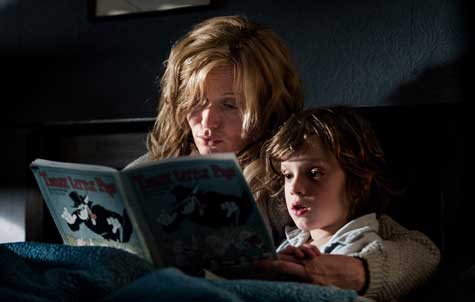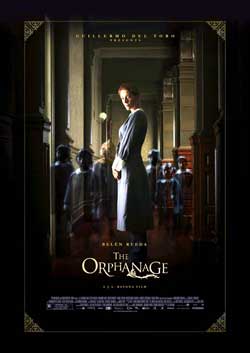
“Get away from her, you bitch!” — Ellen Ripley (Aliens)
DON'T MESS WITH MOTHER NATURE
Being a mom is a full-time, lifetime, really difficult job even in the best of situations. When you throw a mother and her child into a horror scenario, the stakes get infinitely higher. Not all ladies have a strong maternal drive, of course, this writer being one of them. But a lot of us do, and given how society often expects and demands women to take care of children, a mother serves a vital role in horror.
In The Babadook (2014), it's not immediately clear just where the threat lies: within or without. Amelia (Essie Davis) is a single mother wholly focused on her son Samuel (Noah Wiseman) after losing her husband in a violent accident. When Sam starts to develop behavioral issues, she takes him out of school and does her best to address the problems before they get worse.
But things take a turn for the frightening when Sam finds a bizarre pop-up book about a creature called “Mister Babadook.” Unexplained events begin happening in the claustrophobic house, which Amelia blames on Sam and Sam blames on the Babadook. After destroying the grotesque book, Amelia discovers glass in her food and Sam is involved in a bad accident at a party. And then she finds the book repaired—freshly edited to include images of herself doing unspeakable things to the dog, her son, and herself.
The Babadook is one of the most unsettling films I've ever seen. The way it's shot and edited emphasizes how alone this mother and her son are, essentially locked up in their own home with only each other for company—and perhaps a monster bent on destroying them.

The idea of being locked in a house with a monster is absolutely terrifying, but the film's true horror lies in the implications that Amelia may be the real threat. Has her past loss and loneliness driven her mad? Have the pressures of motherhood and the challenges of a kid with special issues become too much for her; is infanticide only a bad moment away?
Director Jennifer Kent does a great job of showing both the loving and dark sides of motherhood in The Babadook, her debut feature. The fact that this was written and directed by a woman is significant. There's a depth of understanding and subtlety here that I doubt a male writer/director would have been able to convincingly convey. “A lot of women struggle,” says Kent. “And it's a very taboo subject, to say that motherhood is anything but a perfect experience for women.”
Motherhood isn't always determined by bonds of blood, either. In the haunting Spanish film The Orphanage (2007), the mother at the heart of the story is Laura (Belén Rueda), who has returned to her childhood orphanage with her husband, adopted son Simon, and big plans to turn the dilapidated building into a new home for disabled children.
 Laura's laudable plans go awry, however, when her son claims to have made a strange friend named Tomás, who wears a burlap sack mask. A creepy social worker begins lurking around the house, digging into the past, and Laura finds evidence of unspeakable crimes dating back to her own childhood.
Laura's laudable plans go awry, however, when her son claims to have made a strange friend named Tomás, who wears a burlap sack mask. A creepy social worker begins lurking around the house, digging into the past, and Laura finds evidence of unspeakable crimes dating back to her own childhood.
Then, at a party, Simon goes missing.
What follows is tragic, unsettling, and incredibly poignant. Just how far will a mother go to be reunited with her son; what will she sacrifice for the good of her child? The Orphanage is, in several ways, about the forgotten. The other orphans Laura grew up with; Simon, who is HIV positive and whose disappearance is eventually accepted by all but his adoptive mother; and the crimes of the past which still demand an accounting.
It's a film that evocatively illustrates the commitment a devoted mother can feel for her children, and how that love and loyalty can drive them to extreme, impossible efforts. “A mother will do anything for her child,” is an oft-repeated maxim, and here it holds true.
Amelia and Laura's climactic actions to protect their children are more emotional and mental than physical, while other horror moms take a more hands-on approach. I like to think of these characters as Bad-Ass Mothers.
They're a pretty common trope at this point. These characters don't even necessarily have to be mothers. They can be mentors or even a surrogate parent—they just have to be willing to face down a knife-wielding maniac or slavering monster to protect a child. They're the ones that go back into the burning building or race the ticking clock. They're willing to risk their lives for the sake of humanity and that's a pretty motherly thing to do.
There's Ripley (Sigourney Weaver), of course, who's essentially everyone's sci-fi godmother, ready to face down an alien Queen and a room full of face-huggers to save little Newt, a proxy for the daughter she lost while in cryo-sleep. Even babysitter Laurie Strode (Jamie Lee Curtis) of the Halloween series fits this mold, as she repeatedly faces down the silent behemoth in a multitude of sequels to protect the children in her care.
One of my favorite Bad-Ass Mothers is Helen Robinson (Carrie-Anne Moss) of the technicolor zombie parody of Lassie, Fido (2006). She's more than capable of baking an apple pie for the neighbors, keeping her cocktail dress spotless, and gunning down a zombie or three to protect her son and his beloved undead pet.
And, of course, sometimes Bad-Ass Mothers make the best baddies. Let's not forget that the slasher taking out horny co-eds in the first Friday the 13th (1980) wasn't Jason—but his dear old mum, doing her best to avenge her darling, dead son.
The whole process of pregnancy and childbirth is a topic ripe for horror, too. There are dozens of movies where a woman gives birth to a monster; while the scene in Cronenberg's The Fly (1986) when Brundle's (Jeff Goldblum) teeth and fingernails fall off is pretty damn disgusting, the moment when Veronica (Geena Davis) gives birth to a giant maggot had a lasting impact on many a lady—my friend's mother was pregnant with her when she saw the film in theaters and had raging nightmares of the same thing happening to her.
Zombie childbirth/babies are a pretty frequent subset of this particular story, too, with Peter Jackson's Braindead (1992, also known as Dead Alive) and the remake of Dawn of the Dead (2004) standing out. What makes these movies extra horrific is the perversion of a natural process and the twisting of something traumatic and emotionally devastating (miscarriages, stillbirth) into something outright monstrous.
Mothers who lose a child would give almost anything to get them back. But as Pet Sematary (1989) and Snow White: A Tale Of Terror (1997) show us, the baby you get back may not be exactly like the one you lost. Instead of a smiling, loving son you may find yourself with a demon.
THE MONSTROUS FEMININE
Horror has always been a genre that pushes boundaries and offends the status quo. It tackles taboo subjects that most people look away from, flaunting such themes out in the open. In “polite” society, we don't talk readily about menstruation or rape, or the unpleasant aspects of pregnancy and motherhood. These things carry a connotation of being “secret” or “dirty”. But in horror such topics can be discussed, dissected, and displayed in a prominent light.
Women make up half of this world's population and our stories deserve to be told, too. We have experiences and fears that no man will ever fully understand. So when someone tells me it's strange that I like horror so much simply because I'm female, I often have to stop myself from laughing sarcastically.
To be a woman is to know horror—and a lot of us like to vent our fears cathartically. A darkened movie theater is as safe a place as any for us.
Read Part 1 and Part 2 of this 3-part feature.
Angie Barry wrote her thesis on the socio-political commentary in zombie films. Meeting George Romero is high on her bucket list, and she has spent hours putting together her zombie apocalypse survival plan. She also writes horror and fantasy in her spare time, and watches far too much Doctor Who. Come find the angie bee at Tumblr.
Read all posts by Angie Barry at Criminal Element.

Congratulations on this three parter, Angie! All of the articles were so well done and a joy to read.
The Babadook is currently in my queue and I can’t wait to check it out. I don’t know if I’ll ever watch the The Orphanage due to my fear of ghost children, but I like that you discussed it here.
“A lot of women struggle,” says Kent. “And it’s a very taboo subject, to
say that motherhood is anything but a perfect experience for women.” That quote is SO true and I’m so glad that a filmmaker chose to address it.
Hi! I’m a friend of Lauren’s and a big supernatural horror fan. I’ve really enjoyed this short series you’ve done.
The Babadook and The Orphanage are two of my recent favorites. I’m not sure I completely agree with your analysis of the Babadook. It was pretty clear to me early on that the Babadook was a manifestation of untreated post-partum depression and unprocessed grief. I don’t think the “Bad-Ass Mother” archetype necessarily comes into play the way it does with The Orphanage and the other films you discuss, because the way to defeat the Babadook isn’t by fighting it and killing it. She has to accept it and care for it and acknowledge its existence. Only then is she able to move forward with her son. So, bad-ass, but a different kind of bad-ass, y’know?
I look forward to reading more from you, Angie!
Wait, rereading I see that you’re classifying the more “hands-on” characters as the Bad-Ass mothers. My bad! Sorry! My brain skipped that transition.
Would love to see this series continue, I think this is great stuff you’re vocalizing here, and in ways I haven’t seen picked-to-death before.
I’ve seen about half the films you’re discussing, and it’s really motivating me to seek out the other half. Hope it continues!